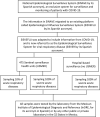The Association of Obesity, Type 2 Diabetes, and Hypertension with Severe Coronavirus Disease 2019 on Admission Among Mexican Patients
- PMID: 32610364
- PMCID: PMC7361939
- DOI: 10.1002/oby.22946
The Association of Obesity, Type 2 Diabetes, and Hypertension with Severe Coronavirus Disease 2019 on Admission Among Mexican Patients
Abstract
Objective: This study's aim was to explore the association of obesity, type 2 diabetes, and hypertension with severe coronavirus disease 2019 (COVID-19) on admission.
Methods: In the present study, a total of 23,593 patient samples were evaluated by a laboratory from the Mexican Institute of Epidemiological Diagnosis and Reference. Of these, 18,443 were negative for COVID-19, 3,844 were positive for COVID-19, and 1,306 were positive for other respiratory viruses. Severe types of respiratory disease were defined by the presence of pneumonia and other organ failure that requires intensive care. Multivariable logistic regression models were used to explore factors associated with severe COVID-19 on admission.
Results: Patients who tested positive for COVID-19 had a higher proportion of obesity (17.4%), diabetes (14.5%), and hypertension (18.9%) compared with those without a confirmed diagnosis. Compared with patients without obesity, those with obesity showed a 1.43-fold higher odds of developing severe COVID-19 on admission, whereas subjects with diabetes and hypertension showed a 1.87-fold and 1.77-fold higher odds of developing severe COVID-19 on admission, respectively.
Conclusions: Obesity, diabetes, and hypertension were significantly associated with severe COVID-19 on admission and the association of obesity was stronger in patients < 50 years of age.
© 2020 The Authors. Obesity published by Wiley Periodicals LLC on behalf of The Obesity Society (TOS).
Conflict of interest statement
The authors declared no conflict of interest.
Figures


References
-
- Lipsitch M, Swerdlow DL, Finelli L. Defining the epidemiology of Covid‐19 ‐ studies needed. N Engl J Med 2020;382:1194‐1196. - PubMed
-
- Cai Q, Chen F, Wang T, et al. Obesity and COVID‐19 severity in a designated hospital in Shenzhen, China. Diabetes Care 2020;43:1392‐1398. - PubMed
-
- Flores M, Barquera S, Carrión C, et al. C‐reactive protein concentrations in Mexican men and women: high prevalence of a cardiovascular risk factor. Salud Publica Mex 2007;49(suppl 3):S348‐S360.
-
- Denova‐Gutiérrez E, Vargas‐Chanes D, Hernández S, Muñoz‐Aguirre P, Napier D, Barquera S. Linking socioeconomic inequalities and type 2 diabetes through obesity and lifestyle factors among Mexican adults: a structural equations modeling approach. Salud Publica Mex 2020;62:192‐202. - PubMed
MeSH terms
LinkOut - more resources
Full Text Sources
Medical

